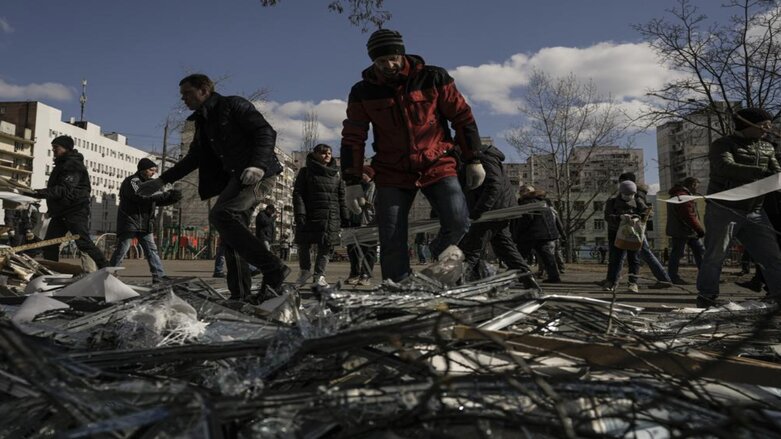As Russian army stumbles in Ukraine, US warns again of possible chemical attack

WASHINGTON DC (Kurdistan 24) – Thousands of Russian troops have died in the first three weeks of fighting in Ukraine, as the war has gone badly for Moscow, US media has reported, citing US intelligence sources.
The dismal performance of Russian forces has reinforced US concerns that Russian President Vladimir Putin will resort to ever-harsher measures in Ukraine, including the use of chemical agents, to overcome the serious deficiencies in the Russian military.
Weakness of Russian Military
Over 7,000 Russian soldiers have died in Ukraine, The New York Times reported on Wednesday. It noted that that number constitutes more fatalities than suffered by US forces in the 20 years of America’s post-9/11 wars in Iraq and Afghanistan.
The Times also said that some 14,000 to 20,000 Russian troops have been injured over the past three weeks.
Putin had expected to take Kiev quickly, and he was clearly given bad intelligence. He reportedly has placed two senior intelligence officials under house arrest.
“They were in charge of providing political intelligence and cultivating networks of support in Ukraine,” an expert on Russia’s security services told the Times. However, “they told Putin what he wanted to hear.”
Over the past fifteen years, Russia has spent “hundreds of billions of dollars restructuring its military into a smaller, better equipped and more professional force,” The Wall Street Journal reported on Thursday.
“Western analysts had been largely impressed by Russia’s effort since 2008 to modernize its military,” the Journal said, but “analysts overestimated the impact” of that hardware: new weapons systems, like battle tanks and jet fighters.
That effort was “undermined by fraud and corruption,” Michael Clarke, a former director of Britain’s Royal United Services Institute, told the Journal. “Weapons systems haven’t performed well,” while “commanders pretended they had capabilities that weren’t there,” it said.
New Warning of Russian Chemical Attack
Speaking to reporters on Thursday, Secretary of State Antony Blinken noted that US intelligence had earlier predicted the Russian assault on Ukraine.
“A few weeks ago, just days before Russia’s invasion began, I went to the United Nations Security Council to lay out what we believed was about to happen,” Blinken said.
“Again today, we have a strong sense of what Russia could do next,” he continued. “We believe that Moscow may be setting the stage to use a chemical weapon, and then falsely blame Ukraine to justify escalating its attacks on the Ukrainian people.”
“Manufacturing events and creating false narratives of genocide to justify greater use of military force is a tactic that Russia has used before,” Blinken stated.
Blinken thus repeated the concern that National Security Adviser Jake Sullivan had conveyed to his Russian counterpart on Wednesday.
Read More: US warns Russia against use of chemical, biological weapons—echoes warnings to Iraq in 1991
That Russian narrative—which US officials have strongly denied—continued on Thursday. Igor Kirillov, head of Russia’s Radiation, Chemical, and Biological Protection Force, claimed that the Russian army had obtained “documentary evidence confirming the Pentagon was involved in financing military biological projects in Ukraine,” as TASS, Russia’s official news agency, reported.
In addition, Russia has once again called for an emergency meeting of the UN Security Council on what it claims are US biological weapons labs in Ukraine. That meeting is being held on Friday morning, local time in New York.
A similar meeting, on the same subject, was held last week.
Russia received little support in that meeting. Most of the officials who spoke at the session dismissed Moscow’s professed concern. They include the UN’s High Representative for Disarmament Affairs, who said that the UN was unaware of any biological weapons laboratories in Ukraine.
They also include Albania’s UN ambassador, who advised that Russia should not present the Security Council with “fantasies and starry-eyed stories”. He also pointed out that Russia, itself, has used chemical weapons, including in attempted assassinations, while it supports the Syrian regime, which has used chemical weapons against its own people.
It is unclear what Moscow expects to gain from a second such session.
Nonetheless, the repeated Russian charge raises the concern that Sullivan expressed on Wednesday and Blinken repeated on Thursday: such charges will prove a pretext for a Russian assault using chemical, or, perhaps even biological, weapons.
